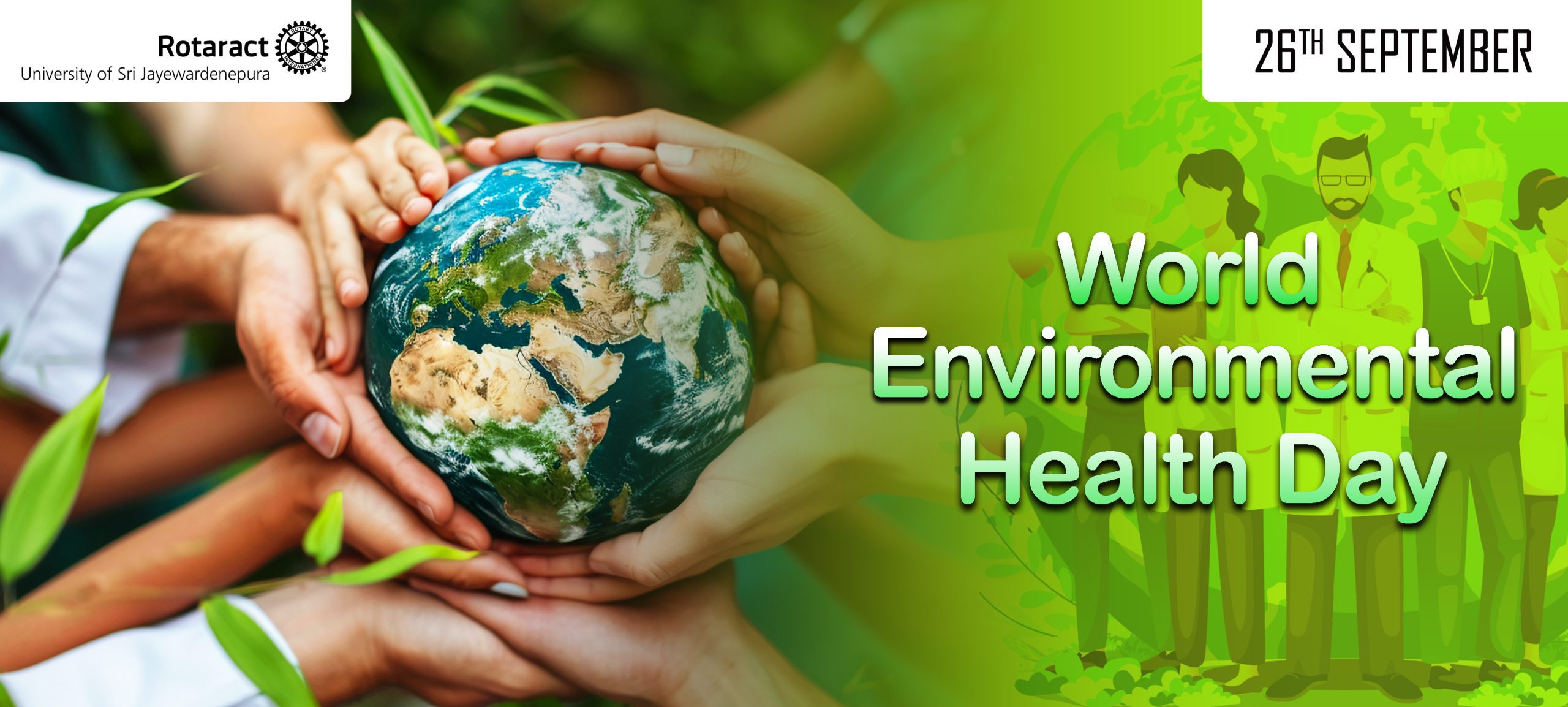Written by: Rtr. Dimasha Fernando
Today, September 26th, is the day when the world unites to create awareness on World Environmental Health Day for the very important linkage between human health and the environment. The environment plays a vital role in public health, encompassing everything in our natural and built surroundings that influences our well- being. The state of the planet is inextricably linked to the health of its people, and that summons for a healthier environment has become urgent, especially for future generations.
This year’s theme, “Environmental Health: Creating Resilient Communities through Disaster Risk Reduction and Climate Change Mitigation and Adaptation,” therefore reflects the growing need for globally united efforts against the pressing challenges we are faced with in environmental health today. The issues of pollution, deforestation, climate change, and waste management are not just isolated issues but are about health, communities, and the very future of our world. With continuous appreciation of natural disasters and climatic uncertainties, a call is made for building resilient communities.
One of the key aspects of environmental health is the air we breathe. Unfortunately, air pollution has silently been acting as a killer, resulting in respiratory diseases, heart conditions, and even premature deaths. Asthma, bronchitis, and other related illnesses continue to surge, especially in urban areas, where the air quality has mostly been so bad. According to the World Health Organization, 9 out of 10 people worldwide breathe air that falls below recommended safety standards. Improvement in the health of the environment relates to an improvement in our health through the reduction of harmful emissions, shifting into cleaner technologies, and switching to renewable energy sources.
Water is equally critical for a healthy environment. Clean, safe water is regarded as one of the basic needs of humans, and yet, up to now, in some parts of the world, millions have remained devoid of this need. Contaminated water becomes a host for deadly diseases like cholera, diarrhea, and typhoid that generally afflict the most vulnerable people. Such issues are further reiterated by the dumping of industrial waste, plastic, and poorly managed sanitation systems into our freshwater and marine ecosystems. A world with increased droughts and floods because of climate change makes this right to clean water even more fragile. In addition, we must focus more on water conservation, reduce the number of pollutants, and handle our waste appropriately to build resilient communities against those challenges.
Nutrition and the environment are another important aspect of environmental health. The ways we produce, process, and distribute food have deep ramifications for the environment. While this may provide a short-term increase in crop return, the use of chemical fertilizers and pesticides will, in the long term, degrade soils, pollute water sources, and significantly reduce biodiversity. Growing demand for food also fuels deforestation, further accelerating climate change and loss of habitats. Since it would be out of reason to think that there could be food security without environmental health, more emphasis should be placed on sustainable farming, supporting local food systems, and reducing food waste.
Probably the most obvious environmental health threat these days is climate change. Rising temperatures, melting ice caps, and extreme weather are considered warning signals that the climate is indeed getting hotter by the minute. Environmental degradation not only poses a direct threat to nature but also to human health. Heatwaves, wildfires, floods, and storms are becoming more frequent and dangerous, thereby continuously posing a rising threat to life and livelihoods. These challenges have been heightened by climate change-for example, in Sri Lanka-in their impact, making it even more difficult to hold onto the notion of a stable environment. This year, World Environmental Health Day takes on the theme of mitigation and adaptation measures against climate change in order to reduce risks for environmental disasters. This will be better preparation for, and thus lessened impact of, these crises brought on by climate change.
World Environmental Health Day is a potent pointer to the fact that health in humans is directly connected with the environment: every breath we take, every drop of water we drink, and every bit of food we eat tells us a story about the state of our environment and what kind of future we are creating. Environmental health is a global issue; taking care of it is our mutual responsibility. A few simple steps of reducing plastic waste, conserving water, and planting more trees can make a big difference in the health of our environment and us. We can make sure of a healthier environment and a bright future for the next generation only by spreading awareness and taking effective measures in this regard.
As we celebrate this important day, let’s focus not only on the challenges at hand, but also make a commitment toward better, more sustainable, healthier choices for ourselves and our planet. For those who would like to delve deeper into the crises at the forefront of the environmental battle, “The Uninhabitable Earth” by David Wallace-Wells covers pressing issues in-depth.
Graphic Design by : Rtr. Dulan Pramod



0 Comments